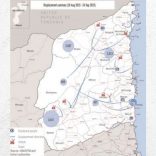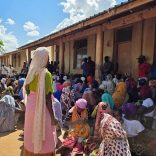Mozambique confirms two more mpox cases - in Maputo province
Mozambique: Renamo rejects invitation from health minister – AIM report

File photo
Parliamentary deputies from the Mozambican rebel movement Renamo on Thursday flatly rejected an invitation from Health Minister Nazira Abdula to come to her office to discuss the problems of the national health service.
The Renamo parliamentary group had asked the government to provide “exhaustive information on the management of the resources allocated to the Ministry of Health”.
On Wednesday the government obliged, and Abdula gave a detailed account of her Ministry’s financial management, and the distribution of medicines. She made it clear that there was no generalised shortage of medicines in the health units, although logistical problems might mean that not every unit would have all the drugs needed on any given day.
She also gave statistics showing a reduction in deaths from killer diseases such as malaria and diarrhoea, and an improvement in the number of health personnel. Thus the number of doctors per 100,000 people has risen from 4.9 in 2014 to eight in 2017.
But Renamo was not interested in facts and figures. After she had finished speaking, Renamo deputies continued to insist that there are no medicines in the health unit, and one even said there are no nurses “much less any doctors”.
Faced with this barrage, Abdula invited the deputies to visit her office – and on Thursday, the second day of the debate, the invitation was rejected. Renamo deputy Ivan Mazanga said they would not go, because the information given by the Minister “contradicts reality”.
Repeatedly Renamo urged the Minister to visit the hospital wards to see the real situation for herself – apparently oblivious of the regular television coverage showing Abdula doing precisely that, visiting hospitals and health centres across the country.
For the ruling Frelimo Party, Caifardine Manasse, noted that, in its complaints about drug shortages, Renamo “does not mention the medicines which it stole”. He was referring to the attacks by Renamo gunmen against health units during the low level insurgency of 2013-14 and again in 2016 in the central provinces.
His colleague Valdemiro Nhacengo attacked the hypocrisy of Renamo in complaining about the state of the roads, when it was Renamo that had dug trenches across the main north-south highway during its insurrection. He noted that during the full-scale war of destabilisation in the 1980s, it had only been possible to build the Corumana and Pequenos Libombos dams in Maputo provinces, because the armed forces defended them from Renamo attack.
“Renamo destroys and then it complains that things haven’t been done”, said Nhacengo.
Alice Tomas accused Renamo of “disinformation”. Its “habitual falsehoods” showed “they must think we are blind”. She noted that, in her province of Tete, in the past people frequently crossed the border into neighbouring countries to obtain health care – however, today the movement is in the opposite direction. “Now it is Malawians. Zambians and Zimbabweans who come into Tete looking for medical care”, she said.
But the most extreme speech on Thursday came, not from any Renamo deputy, but from Venancio Mondlane of the Mozambique Democratic Movement (MDM), who wrote off the entire history of post-independence Mozambique as one long disaster.
Deputies had debated the government’s response to natural disasters, “but what is leading the country to the abyss, to a funereal and hopeless future is not natural disasters, but human ones, the disaster that has been devastating the country ever since 25 June 1975 (the date of Mozambican independence)”. Thus Mondlane seemed to suggest that Mozambique had been better off under Portuguese colonial rule.
Frelimo deputy Joao Amade retorted “it’s sad to see a young man who is a product of Mozambican independence dismiss independence as a disaster. It’s sad to see someone look in a mirror and decide that his own face is a disaster”.












Leave a Reply
Be the First to Comment!
You must be logged in to post a comment.
You must be logged in to post a comment.